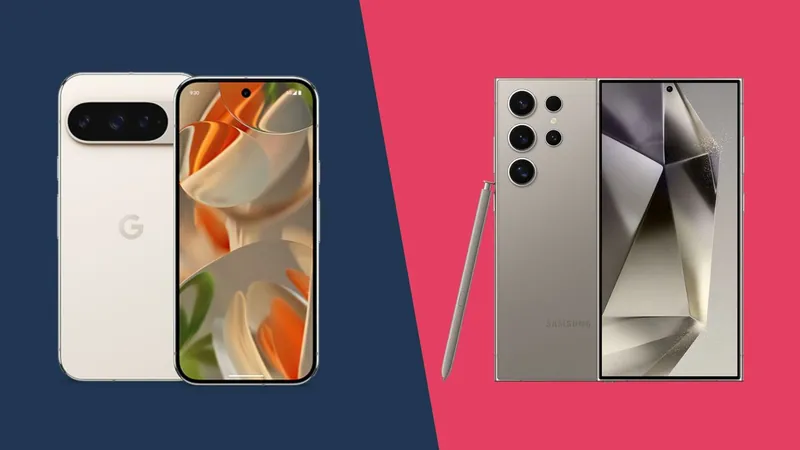
Google Pixel 9 Pro vs Samsung Galaxy S24 Ultra: The Ultimate Clash of AI-Powered Smartphones!
2024-09-15
As the smartphone market evolves, Google has disrupted the flagship segment with its latest Google Pixel 9 series, launching two months earlier than expected. The standout model, the Google Pixel 9 Pro, has been receiving rave reviews, bagging an impressive 4.5 out of 5 stars from critics. But can it dethrone the formidable Samsung Galaxy S24 Ultra, the reigning champion of 2024?
Specifications Showdown: A Quick Glance
Release Dates: The Pixel 9 Pro hit the shelves on August 22, 2024, a full seven months after the Galaxy S24 Ultra’s debut on January 31.
Pricing: Starting at $999 for the base model with 128GB, the Pixel 9 Pro offers additional storage options up to 1TB, while the Galaxy S24 Ultra begins at $1,299 for its 256GB version.
Design: Apples and Oranges
Physically, these devices present a stark contrast. Samsung’s Galaxy S24 Ultra is a behemoth at 162.3 x 79 x 8.6mm and weighs 232g, dwarfing the more pocket-friendly Pixel 9 Pro at 152.8 x 72 x 8.5mm and 199g. The Galaxy's robust design boasts titanium strength but sacrifices some portability. Featuring Gorilla Glass Victus 2, the Pixel 9 Pro embraces a sleek and ergonomic design, while the S24 Ultra flaunts its camera modules – a more utilitarian approach.
Notably, the Galaxy S24 Ultra includes the S Pen, offering a feature that appeals to creatives or those who jot notes frequently.
Display: Size Matters, But So Does Brightness
In the display department, the Pixel 9 Pro features a 6.3-inch AMOLED, while the Galaxy S24 Ultra showcases a 6.9-inch powerhouse. The S24 Ultra boasts a higher resolution (1440 x 3120) versus the Pixel 9 Pro’s 1280 x 2856, but the latter shines with a peak brightness of 3,000 nits compared to Samsung’s 2,600 nits — perfect for outdoor visibility. Both devices utilize LTPO technology for optimized refresh rates, ensuring smooth scrolling and responsiveness.
Camera Capabilities: Who’s the King of Photography?
When it comes to camera performance, both phones impress. The Pixel 9 Pro features a 50MP main sensor that excels in low-light conditions, thanks to Google's advanced image processing. On the other hand, the Galaxy S24 Ultra may pack a staggering 200MP sensor, but its true strength lies in its versatility with zoom — offering a selection of zoom levels unmatched by competitors.
Both devices are capable of excellent videos, but if you're seeking high-definition filmmaking, the Galaxy S24 Ultra takes the lead with 8K recording capabilities, leaving the Pixel 9 Pro’s 4K option trailing behind.
Performance: Raw Power vs. AI Innovations
While both phones are well-equipped for daily tasks, the Galaxy S24 Ultra’s Snapdragon 8 Gen 3 processor delivers a significant edge over the Pixel 9 Pro’s Tensor G4 in benchmarking tests. For demanding applications and high-end gaming, it is clear that the S24 Ultra reigns supreme.
However, Google leans heavily into AI with its Tensor chip, offering unique features like the Reimagine tool for enhanced photo editing, making the Pixel 9 Pro an intriguing device for those focused on creative tasks.
Battery Life Battle: Endurance Counts
In terms of battery capacity, the Galaxy S24 Ultra (5,000mAh) outlasts the Pixel 9 Pro (4,700mAh), with lab tests showing impressive endurance of nearly 17 hours versus 13.25 hours. Yet, the Pixel 9 Pro is designed for moderate use, serving plenty of power for average daily activities.
Charging speeds are relatively comparable, with the S24 Ultra supporting faster wired charging (47W) versus the Pixel's 27W. Interesting to note, the Galaxy supports 15W wireless charging, whereas the Pixel can reach up to 21W with a special stand.
Conclusion: The Final Verdict
So, which smartphone should you choose? The Pixel 9 Pro provides a fantastic, compact flagship experience with outstanding AI capabilities and exceptional camera performance perfect for regular users. Conversely, the Galaxy S24 Ultra attracts power users with its sheer size, battery longevity, and top-notch performance metrics that are hard to overlook.
Ultimately, both phones stand at the pinnacle of the mobile market. Depending on your preferences — whether they lean towards everyday functionality or feature-rich performance — either choice is bound to leave you satisfied. Which one will be your personal champion?


 Brasil (PT)
Brasil (PT)
 Canada (EN)
Canada (EN)
 Chile (ES)
Chile (ES)
 España (ES)
España (ES)
 France (FR)
France (FR)
 Hong Kong (EN)
Hong Kong (EN)
 Italia (IT)
Italia (IT)
 日本 (JA)
日本 (JA)
 Magyarország (HU)
Magyarország (HU)
 Norge (NO)
Norge (NO)
 Polska (PL)
Polska (PL)
 Schweiz (DE)
Schweiz (DE)
 Singapore (EN)
Singapore (EN)
 Sverige (SV)
Sverige (SV)
 Suomi (FI)
Suomi (FI)
 Türkiye (TR)
Türkiye (TR)